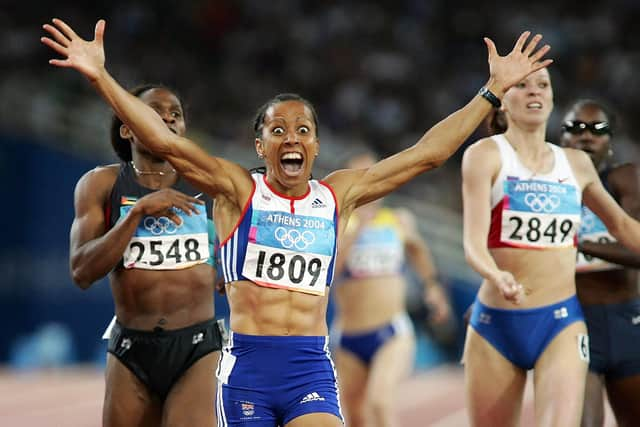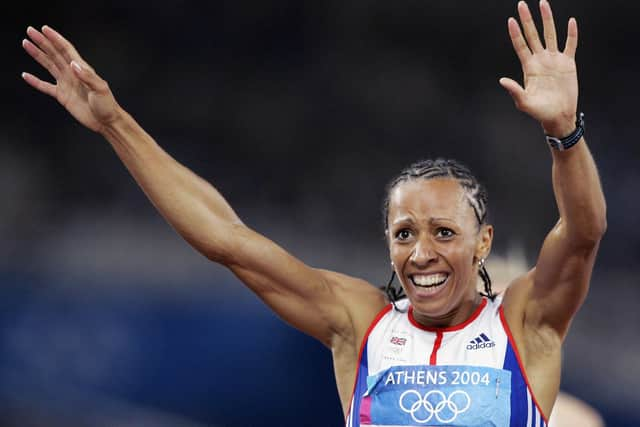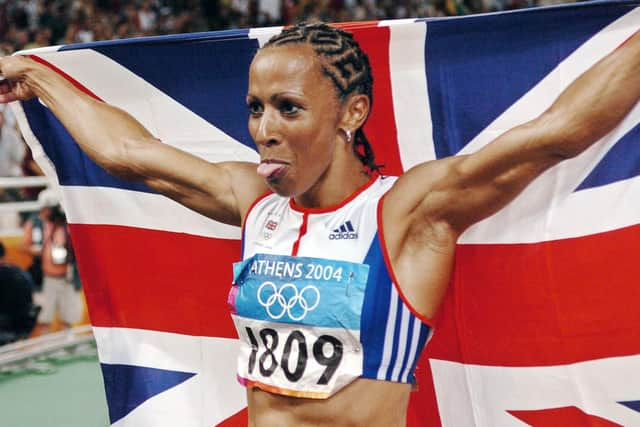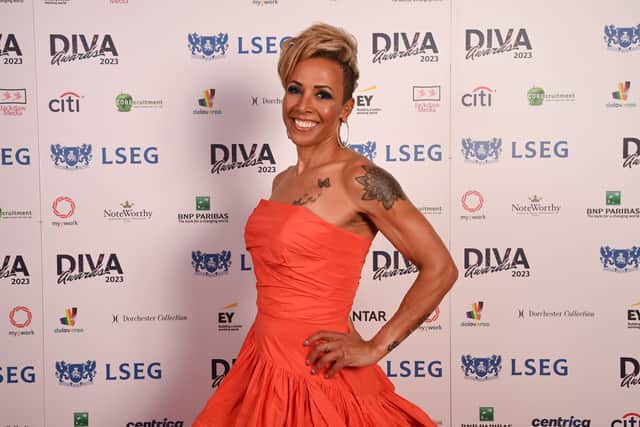Dame Kelly Holmes interview: 'One person made a difference for me, I can be that person of others,' says double Olympic champ
Dame Kelly Holmes, arms outstretched, eyeballs nearly popping out of their sockets, crossing the line to win gold in the Olympic 800m final in Athens in 2004.
A poster girl for what might have been, of the toll injuries can take on an athlete, was finally an Olympic champion, and a few days later she would add the 1,500m to the 800m she had won earlier in the Games for a historic double.
Advertisement
Hide AdAdvertisement
Hide AdSeb Coe never managed the double. Neither did Steve Ovett. But Kelly Holmes did, an accomplishment that still to this day is unmatched in women’s British athletics history.
“Nineteen years ago, I can’t believe it,” says Holmes, the eyes now sparkling as the mind wanders back. You get the impression no matter how many times she is asked she will never tire of recalling her golden double, like Geoff Hurst and that World Cup final hat-trick.
“You never forget it, because you never forget the journey you went on.
“Any sports person sitting in front of you will tell you the journey’s hard.
Advertisement
Hide AdAdvertisement
Hide Ad“It was a big one for me at the end of a 12-year international career in which at the same time I was a soldier.


“I had to fight to be the person I wanted to be, it was about using different skillsets in sport. Sport like the army was quite institutionalised, what you’re doing, what’s the process, and finally and luckily - well not luckily because I worked hard - it all worked out well in the end, far better than I thought it would have.”
Why? Because of one word that still resonates with Holmes in the second phase of her professional life - resilience.
“It’s because I didn’t give up,” she says.
“Seven years of injuries out of 12 years of an athletics career. I was fourth in Atlanta with a stress fracture, bronze in Sydney.


Advertisement
Hide AdAdvertisement
Hide Ad“I won 13 international medals in my career through seven years of injury so it wasn’t bad.
“But to be the best I had the resilience, I ended up believing I could be something, I could be someone and I had a good starting point because somebody believed in me.”
That one person was her PE teacher Debbie Page, who would in later life become a friend.
“She told me I could be good, encouraged me to be good, otherwise I don’t know who I would have been,” remembers Holmes. “I wasn’t really academic at school, I didn’t really know what purpose I had, and it just needed that one person in my life to make a difference to me.


Advertisement
Hide AdAdvertisement
Hide Ad“She told me I wasn’t applying myself, that I could be better than I thought I could be, to believe in myself, to take myself out of my comfort zone and try and make a difference, and I did that, I found it in sport.
“I always wanted to be that person for someone else going forward.”
And much of her life after athletics has been about fulfilling that ambition. Fifteen years ago, she used the weight of her name and reputation to launch the Dame Kelly Holmes Trust, a youth development charity that has a slogan ‘Tthere’s a champion on your shoulder’.
That champion does not necessarily have to be Holmes, just someone to express belief in a young person.
Advertisement
Hide AdAdvertisement
Hide AdHolmes and her team of former athletes turned mentors including former Olympic swimmer James Kirton from Barnsley and badminton player Jenny Wallwork from Leeds who both competed in Beijing 2008, were in Sheffield this week to celebrate their anniversary with 150 children from across 10 schools in the city.
“We’re 15 years old and Sheffield was a great place for us to come because of the young people, their lower socio economic backgrounds that they have, and Westfield Health have been invested in us now for a second year, they’re invested in us making a difference to young people,” explains Holmes. “We’ve had some transformational programmes that are delivered by elite sports people, the premise of getting those young people to show their resilience, their mindset, and empower them to become somebody.


“I started the Trust because I believe one person can make a difference as that one person did in my life.
“Elite sports people have the ability to articulate how even though you can be successful, how hard a journey it is to be good and that is about resilience, picking yourself up when you have a perceived failure in your life, it’s about saying ‘no, I’m not going to stay down here I’m going to push up’.
Advertisement
Hide AdAdvertisement
Hide Ad“I can convey this message, but what was more important is that I could have other people who could spread the message as well.”
Giving the likes of Kirton and Wallwork a second career is like that 1,500m gold on top of the 800m title, an extra benefit to the work the Trust is doing with young people.
“When people do sport and then they finish you don’t really think about what they might do afterwards,” continues Holmes.
“People don’t care as much about these sportspeople who have invested their life’s journey into sporting success. We watch their highs and their lows on telly, but we’re not invested in their life journey to get there. So when they finish a lot of sportspeople discover their identity is gone, so your starting point is back to zero.
Advertisement
Hide AdAdvertisement
Hide Ad“What we’re enabling with our Trust is that common ground of finding a purpose, and that purpose is making a difference to others and it’s making them feel valued again, they have something they need to do, a structure because they’ve become a mentor.”
The Trust’s On Track to Achieve programme is aligned with the Move More Sheffield strategy, which highlights the importance of physical and mental well-being.
“Young people’s mental health is deteriorating,” warns Holmes, whose Trust engages 80 per cent of its young people from low socio-economic backgrounds.
“We had the pandemic, everybody was in a real struggle, charities were in a struggle but we were able to maintain our connection with a lot of the young people we worked with and we realised now that wellbeing is a massive part of our life and our development. So if we can encourage young people to believe in themselves, to use their ability, use their environment and what they’re given - and when we do our programme there’s a lot of activities because activity creates cohesion, it creates competition, a healthy lifestyle in terms of active, thinking and being - then that’s the goal.
Advertisement
Hide AdAdvertisement
Hide Ad“End of the day these young people are our future and if you don’t capture and help give them those skills that will take them into being a better person.
“I don’t cry that much but when I see some of the young people, hear some of their stories and the changes it’s made to their lives it does make me feel overwhelmed.”